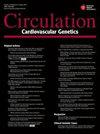Genetic Risk Scores Predict Recurrence of Acute Coronary Syndrome
Q Medicine
引用次数: 24
Abstract
Background—Several clinical risk estimation tools have established their role in the prediction of recurrence of acute coronary syndrome (ACS), but the value of genetic risk scores (GRSs) remains unclear. We examined how well 2 different GRSs estimate recurrent ACS and whether clinical factors are associated with GRSs. Methods and Results—A cohort of 2090 consecutive patients with ACS who underwent coronary angiography between July 2006 and March 2008 in a single tertiary center was genotyped and prospectively followed up for a median of 5.5 years. We formed 2 partially overlapping GRSs: GRS47 of 47 single-nucleotide polymorphisms with previously reported significant association with coronary artery disease and GRS153 of 153 single-nucleotide polymorphisms with significant or suggestive association with coronary artery disease. GRS47 showed association with recurrent ACS independent of clinical factors (P=0.037; hazard ratio, 1.17; 95% confidence interval, 1.01–1.36). GRS153 had no association with either recurrent ACS or composite of recurrent ACS or death. Also, GRS47 was associated inversely with smoking and ST-segment–elevation myocardial infarction (P=0.004; odds ratio, 0.22; 95% confidence interval, 0.08–0.62 and P=0.041; odds ratio, 0.36; 95% confidence interval, 0.13–0.96, respectively). Conclusions—GRSs combined of 47 known coronary artery disease risk single-nucleotide polymorphisms were associated with recurrent ACS after multivariable adjustments in a heterogenic ACS population for the first time. Smoking and ST-segment–elevation myocardial infarction had an inverse association with the GRSs. The significance of smoking in relation to genetic coronary artery disease predisposition may merit further evaluation in patients with ACS.遗传风险评分预测急性冠状动脉综合征复发
背景:几种临床风险评估工具已经确立了它们在预测急性冠脉综合征(ACS)复发中的作用,但遗传风险评分(GRSs)的价值仍不清楚。我们检查了2种不同的GRSs对复发性ACS的评估效果,以及临床因素是否与GRSs相关。方法和结果:对2006年7月至2008年3月在单一三级中心连续接受冠状动脉造影的2090例ACS患者进行了基因分型,并进行了中位5.5年的前瞻性随访。我们形成了2个部分重叠的GRSs:先前报道的与冠状动脉疾病显著相关的47个单核苷酸多态性中的GRS47,以及与冠状动脉疾病显著或暗示相关的153个单核苷酸多态性中的GRS153。GRS47与ACS复发相关,与临床无关(P=0.037;风险比1.17;95%置信区间为1.01-1.36)。GRS153与复发性ACS或复合复发性ACS或死亡均无相关性。此外,GRS47与吸烟和st段抬高型心肌梗死呈负相关(P=0.004;优势比0.22;95%置信区间为0.08-0.62,P=0.041;优势比0.36;95%置信区间分别为0.13-0.96)。结论:在异质性ACS人群中,grss联合47个已知冠状动脉疾病风险单核苷酸多态性首次与ACS复发相关。吸烟和st段抬高型心肌梗死与GRSs呈负相关。吸烟与遗传性冠状动脉疾病易感性的关系值得在ACS患者中进一步评估。
本文章由计算机程序翻译,如有差异,请以英文原文为准。
求助全文
约1分钟内获得全文
求助全文
来源期刊

Circulation-Cardiovascular Genetics
CARDIAC & CARDIOVASCULAR SYSTEMS-GENETICS & HEREDITY
CiteScore
3.95
自引率
0.00%
发文量
0
期刊介绍:
Circulation: Genomic and Precision Medicine considers all types of original research articles, including studies conducted in human subjects, laboratory animals, in vitro, and in silico. Articles may include investigations of: clinical genetics as applied to the diagnosis and management of monogenic or oligogenic cardiovascular disorders; the molecular basis of complex cardiovascular disorders, including genome-wide association studies, exome and genome sequencing-based association studies, coding variant association studies, genetic linkage studies, epigenomics, transcriptomics, proteomics, metabolomics, and metagenomics; integration of electronic health record data or patient-generated data with any of the aforementioned approaches, including phenome-wide association studies, or with environmental or lifestyle factors; pharmacogenomics; regulation of gene expression; gene therapy and therapeutic genomic editing; systems biology approaches to the diagnosis and management of cardiovascular disorders; novel methods to perform any of the aforementioned studies; and novel applications of precision medicine. Above all, we seek studies with relevance to human cardiovascular biology and disease. Manuscripts are examined by the editorial staff and usually evaluated by expert reviewers assigned by the editors. Both clinical and basic articles will also be subject to statistical review, when appropriate. Provisional or final acceptance is based on originality, scientific content, and topical balance of the journal. Decisions are communicated by email, generally within six weeks. The editors will not discuss a decision about a manuscript over the phone. All rebuttals must be submitted in writing to the editorial office.
 求助内容:
求助内容: 应助结果提醒方式:
应助结果提醒方式:


